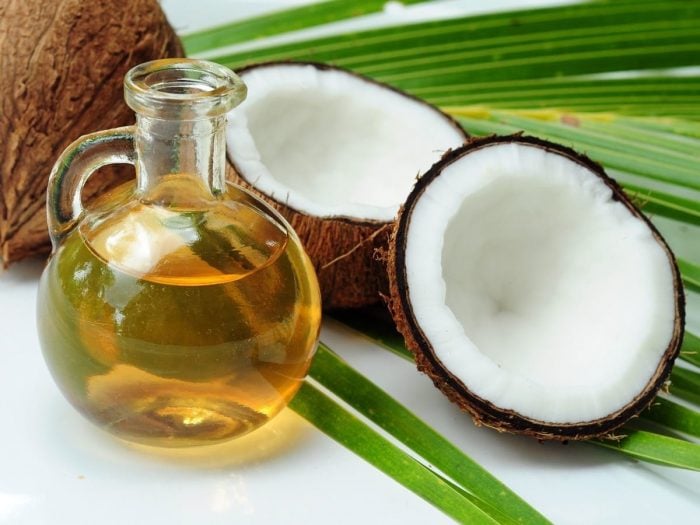About alberto de leon(Health & Nutrition)vox-70 http://www.organicfacts.net/organic-oils/organic-coconut-oil/health-benefits-of-coconut-oil.html http://www.coconutresearchcenter.org/ ..........................................................................................................................................................................................................................................................................................................................................................................................................................................................................................................
 Coconut oil has been described as "the healthiest oil on earth." That's quite a remarkable statement. What makes coconut oil so good? What makes it different from all other oils, especially other saturated fats?
Coconut oil has been described as "the healthiest oil on earth." That's quite a remarkable statement. What makes coconut oil so good? What makes it different from all other oils, especially other saturated fats?
The difference is in the fat molecule. All fats and oils are composed of molecules called fatty acids. There are two methods of classifying fatty acids. The first you are probably familiar with, is based on saturation. You have saturated fats, monounsaturated fats, and polyunsaturated fats. Another system of classification is based on molecular size or length of the carbon chain within each fatty acid. Fatty acids consist of long chains of carbon atoms with hydrogen atoms attached. In this system you have short-chain fatty acids (SCFA), medium-chain fatty acids (MCFA), and long-chain fatty acids (LCFA). Coconut oil is composed predominately of medium-chain fatty acids (MCFA), also known as medium-chain triglycerides (MCT). . .. ... MCFA are very different from LCFA. They do not have a negative effect on cholesterol and help to protect against heart disease. MCFA help to lower the risk of both atherosclerosis and heart disease. It is primarily due to the MCFA in coconut oil that makes it so special and so beneficial.
There are only a very few good dietary sources of MCFA. By far the best sources are from coconut and palm kernel oils.
.................................................................................................................................................................
 ......................................................................................................................................................
......................................................................................................................................................



 Bones: As mentioned earlier, coconut oil improves the ability of our body to absorb important minerals. These include calcium and magnesium which are necessary for development of bones. Thus coconut oil is very useful to women who are prone to osteoporosis after middle age.
Bones: As mentioned earlier, coconut oil improves the ability of our body to absorb important minerals. These include calcium and magnesium which are necessary for development of bones. Thus coconut oil is very useful to women who are prone to osteoporosis after middle age.
....................................................................................................................................................................
....................................................................................................................................................................... .

 Coconut oil has been described as "the healthiest oil on earth." That's quite a remarkable statement. What makes coconut oil so good? What makes it different from all other oils, especially other saturated fats?
Coconut oil has been described as "the healthiest oil on earth." That's quite a remarkable statement. What makes coconut oil so good? What makes it different from all other oils, especially other saturated fats?The difference is in the fat molecule. All fats and oils are composed of molecules called fatty acids. There are two methods of classifying fatty acids. The first you are probably familiar with, is based on saturation. You have saturated fats, monounsaturated fats, and polyunsaturated fats. Another system of classification is based on molecular size or length of the carbon chain within each fatty acid. Fatty acids consist of long chains of carbon atoms with hydrogen atoms attached. In this system you have short-chain fatty acids (SCFA), medium-chain fatty acids (MCFA), and long-chain fatty acids (LCFA). Coconut oil is composed predominately of medium-chain fatty acids (MCFA), also known as medium-chain triglycerides (MCT). . .. ... MCFA are very different from LCFA. They do not have a negative effect on cholesterol and help to protect against heart disease. MCFA help to lower the risk of both atherosclerosis and heart disease. It is primarily due to the MCFA in coconut oil that makes it so special and so beneficial.
There are only a very few good dietary sources of MCFA. By far the best sources are from coconut and palm kernel oils.
.................................................................................................................................................................
Health Benefits of Coconut Oil
The health benefits of coconut oil include hair care, skin care, stress relief, maintaining cholesterol levels, weight loss, increased immunity, proper digestion and metabolism, relief from kidney problems, heart diseases, high blood pressure, diabetes, HIV and cancer, dental care, and bone strength. These benefits of oil can be attributed to the presence of lauric acid, capric acid and caprylic acid, and its properties such as antimicrobial, antioxidant, antifungal, antibacterial and soothing properties.

How is Lauric Acid Used by our body?
The human body converts lauric acid into monolaurin which is claimed to help in dealing with viruses and bacteria causing diseases such as herpes, influenza, cytomegalovirus, and even HIV. It helps in fighting harmful bacteria such as listeria monocytogenes and helicobacter pylori, and harmful protozoa such as giardia lamblia. As a result of these various healthbenefits of coconut oil, though its exact mechanism of action was unknown, it has been extensively used in Ayurveda, the traditional Indian medicinal system. The Coconut Research Center has compiled various benefits in both traditional and modern medicine.

Before we move on to the benefits of coconut oil in detail, let us understand its composition.
Composition of Coconut Oil:
Coconut oil consists of more than ninety percent of saturated fats (Don’t panic! First read to the last word. Your opinion may change), with traces of few unsaturated fatty acids, such as monounsaturated fatty acids and polyunsaturated fatty acids. Virgin coconut oil is no different from this. Let us have a bit detailed study of this..
- Saturated fatty acids: Most of them are medium chain triglycerides, which are supposed to assimilate well. Lauric acid is the chief contributor, with more than forty percent of the share, followed by capric acid, caprylic acid, myristic acid and palmitic.
- Polyunsaturated fatty acids: Linoleic acid.
- Monounsaturated fatty acids: Oleic acid.
- Poly-phenols: Coconut contains gallic acid, which is phenolic acid. These poly-phenols are supposed to be responsible for the fragrance and the taste of coconut oil and Virgin Coconut Oil is rich in these poly-phenols.
- Certain derivatives of fatty acid like betaines, ethanolamide, ethoxylates, fatty esters, fatty polysorbates, monoglycerides and polyol esters.
- Fatty chlorides, fatty alcohol sulphate and fatty alcohol ether sulphate, all of which are derivatives of fatty alcohols.
- Vitamin-E and Vitamin K and minerals such as Iron.
Health Benefits of Coconut Oil

Let us now explore the benefits of coconut oil in detail:
Hair Care:
Coconut oil is one of the best natural nutrition for hair. It helps in healthy growth of hair providing them a shiny complexion. It is effective in reducing the protein loss for damaged and undamaged hair.
Coconut oil is extensively used in the Indian sub-continent for hair care. Most of the people in these countries apply coconut oil on their hair daily after bath. It is an excellent conditioner and helps in the re-growth of damaged hair. It also provides the essential proteins required for nourishing damaged hair. Research study indicates that coconut oil provides better protection to hair from damage caused by hygral fatigue.
Regular head massage with coconut oil ensures that your scalp is free of dandruff, even if your scalp is dry. It also helps in keeping hair and scalp free from lice and lice eggs.
It is therefore used as hair care oil and used in manufacturing various conditioners, and dandruff relief creams. Coconut oil is normally applied topically for hair care.
Skin Care:
Coconut oil is excellent massage oil for the skin as well. It acts as an effective moisturizer on all types of skins including dry skin. The benefit of coconut oil on the skin is comparable to that of mineral oil. Further, unlike mineral oil, there is no chance of having any adverse side effects on the skin with the application of coconut oil. Coconut oil therefore is a safe solution for preventing dryness and flaking of skin. It also delays wrinkles, and sagging of skin which normally become prominent with age. Coconut oil also helps in treating various skin problems including psoriasis, dermatitis, eczema and other skin infections. Therefore coconut oil forms the basic ingredient of various body care products such as soaps, lotions, creams, etc., used for skin care. Coconut oil also helps in preventing premature aging and degenerative diseases due to its antioxidant properties.
Heart Diseases:
There is a misconception spread among many people that coconut oil is not good for the heart. This is because it contains a large quantity of saturated fats. However, coconut oil is beneficial for the heart. It contains about 50% lauric acid, which helps in preventing various heart problems including high cholesterol levels and high blood pressure. The saturated fats present in coconut oil are not harmful as it happens in case of othervegetables oils. It does not lead to increase in LDL levels. It also reduces the incidence of injury in arteries and therefore helps in preventing atherosclerosis.
The saturated fats present in coconut oil are not harmful as it happens in case of othervegetables oils. It does not lead to increase in LDL levels. It also reduces the incidence of injury in arteries and therefore helps in preventing atherosclerosis.
 The saturated fats present in coconut oil are not harmful as it happens in case of othervegetables oils. It does not lead to increase in LDL levels. It also reduces the incidence of injury in arteries and therefore helps in preventing atherosclerosis.
The saturated fats present in coconut oil are not harmful as it happens in case of othervegetables oils. It does not lead to increase in LDL levels. It also reduces the incidence of injury in arteries and therefore helps in preventing atherosclerosis.Weight Loss
Coconut oil is very useful in reducing weight. It contains short and medium-chain fatty acids that help in taking off excessive weight. It is also easy to digest and it helps in healthy functioning of the thyroid and enzymes systems. Further, it increases the body metabolism by removing stress on pancreases, thereby burning out more energy and helping obese and overweight people reduce their weight. Hence, people living in tropical coastal areas, who eat coconut oil daily as their primary cooking oil, are normally not fat, obese or overweight.
Digestion
Internal use of coconut oil occurs primarily as cooking oil. Coconut oil helps in improving the digestive system and thus prevents various stomach and digestion related problems including irritable bowel syndrome. The saturated fats present in coconut oil have anti microbial properties and help in dealing with various bacteria, fungi, parasites, etc., that cause indigestion. Coconut oil also helps in absorption of other nutrients such as vitamins, minerals and amino acids.
Immunity:
Coconut oil is also good for the immune system. It strengthens the immune system as it contains antimicrobial lipids, lauric acid, capric acid and caprylic acid which have antifungal, antibacterial and antiviral properties. The human body converts lauric acid into monolaurin which is claimed to help in dealing with viruses and bacteria causing diseases such as herpes, influenza, cytomegalovirus, and even HIV. It helps in fighting harmful bacteria such as listeria monocytogenes and heliobacter pylori, and harmful protozoa such as giardia lamblia.
Healing and Infections
When applied on infections, it forms a chemical layer which protects the infected body part from external dust, air, fungi, bacteria and virus. Coconut oil is most effective on bruises as it speeds up the healing process by repairing damaged tissues.
Infections: Coconut oil is very effective against a variety of infections due to its antifungal, antiviral, and antibacterial properties. According to the Coconut Research Center, coconut oil kills viruses that cause influenza, measles, hepatitis, herpes, SARS, etc. It also kills bacteria that cause ulcers, throat infections, urinary tract infections, pneumonia, and gonorrhea, etc. Coconut oil is also effective on fungi and yeast that cause candidiasis, ringworm, athlete's foot, thrush, diaper rash, etc.
Other:
Coconut oil is strongly recommended for other benefits which are given below. Usage of coconut oils mildly helps for the following:
Liver: The presence of medium chain triglycerides and fatty acids helps in preventing liver diseases as they substances are easily converted into energy when they reach the liver, thus reducing work load on the liver and also preventing accumulation of fat.
Kidney: Coconut oil helps in preventing kidney and gall bladder diseases. It also helps in dissolving kidney stones.
Pancreatitis: Coconut oil is also believed to be useful in treating pancreatitis.
Stress Relief: Coconut oil is very soothing and hence it helps in removing stress. Applying coconut oil to the head followed with a gentle massage helps in removing mental fatigue.
Diabetes: Coconut oil helps in controlling blood sugar, and improves the secretion of insulin. It also helps in effective utilization of blood glucose, thereby preventing and treating diabetes.
 Bones: As mentioned earlier, coconut oil improves the ability of our body to absorb important minerals. These include calcium and magnesium which are necessary for development of bones. Thus coconut oil is very useful to women who are prone to osteoporosis after middle age.
Bones: As mentioned earlier, coconut oil improves the ability of our body to absorb important minerals. These include calcium and magnesium which are necessary for development of bones. Thus coconut oil is very useful to women who are prone to osteoporosis after middle age.
Dental Care: Calcium is an important element present in teeth. Since coconut oil facilitates absorption of calcium by the body, it helps in getting strong teeth. Coconut oil also stops tooth decay.
HIV and Cancer: It is believed that coconut oil plays an instrumental role in reducing viral susceptibility of HIV and cancer patients. Preliminary research has shown indications of the effect of coconut oil on reducing the viral load of HIV patients (Reference).
Finally, coconut oil is often preferred by athletes and body builders and by those who are dieting. The reason behind this being that coconut oil contains lesser calories than other oils, its fat content is easily converted into energy and it does not lead to accumulation of fat in the heart and arteries. Coconut oil helps in boosting energy and endurance, and enhances the performance of athletes.
Coconut Oil and Alzheimer's Disease: There are reports of research conducted by Dr. Newport stating that coconut oil is useful for treating Alzheimer's disease. Apart from this there is no scientific evidence or traditional knowledge or coconut oil being used for treating Alzheimer's. It was also not known traditionally that coconut oil helps in the brain function.
Why is Coconut Oil Solid?: Unlike most other oils, coconut oil has a high melting point - about 24 to 25 degrees Celsius or 76-78 Fahrenheit. Therefore it is solid at room temperature and melts only when the temperatures go high. Hence, if you buy a bottle of coconut oil and find it solid, don't think that there is some problem with it. Coconut oil is like this only. And of course, don't keep it in your refrigerator.
How to Use Coconut Oil?: If you are using coconut oil for topical purposes, especially hair care, just melt the oil (if it is solid) by keeping the bottle in the sun or warm water. You can also take some coconut oil out and put it in a small bowl and heat the bowl over a flame (do not use microwave). Then take the oil on your palm and apply it to your hair. If you want to use it for internal consumption, simply replace butter or vegetable oils with coconut oil in your recipes. Remember, you need not switch to coconut oil completely, as you will miss the benefits of other oils and dairy products.
Can I Use Coconut Oil for Cooking?: Yes, in most of the tropical coastal regions, people use coconut oil for cooking.
I Don't Like the Taste of Coconut Oil. What Should I do?: Try using coconut oil in some different recipe. That may help. If you get nauseated after eating coconut oil, don't force yourself. As it happens with any other food item, your body may be allergic to coconut oil and it is best not to consume it.
This article is written by Kiran Patil
Visit the website of Coconut Research Center to get a list of the scientific literature on coconut oil
Sources of photos: Coconut oil: SXC.hu; woman combing hair, measuring waist, healthy kid, middle aged woman: PhotoXpress
....................................................................................................................................................................
Coconut
(Cocos nucifera)
The Tree of Life
The scientific name for coconut is Cocos nucifera. Early Spanish explorers called it coco, which means "monkey face" because the three indentations (eyes) on the hairy nut resembles the head and face of a monkey. Nucifera means "nut-bearing." The coconut provides a nutritious source of meat, juice, milk, and oil that has fed and nourished populations around the world for generations. On many islands coconut is a |  Harvested coconuts lined up on the beach. |
staple in the diet and provides the majority of the food eaten. Nearly one third of the world's population depends on coconut to some degree for their food and their economy. Among these cultures the coconut has a long and respected history.
Coconut is highly nutritious and rich in fiber, vitamins, and minerals. It is classified as a "functional food" because it provides many health benefits beyond its nutritional content. Coconut oil is of special interest because it possesses healing properties far beyond that of any other dietary oil and is extensively used in traditional medicine among Asian and Pacific populations. Pacific Islanders consider coconut oil to be the cure for all illness. The coconut palm is so highly valued by them as both a source of food and medicine that it is called "The Tree of Life." Only recently has modern medical science unlocked the secrets to coconut's amazing healing powers. Coconut In Traditional Medicine People from many diverse cultures, languages, religions, and races scattered around the globe have revered the coconut as a valuable source of both food and medicine. Wherever the coconut palm grows the people have learned of its importance as a effective medicine. For thousands of years coconut products have held a respected and valuable place in local folk medicine. In traditional medicine around the world coconut is used to treat a wide variety of health problems including the following: abscesses, asthma, baldness, bronchitis, bruises, burns, colds, constipation, cough, dropsy, dysentery, earache, fever, flu, gingivitis, gonorrhea, irregular or painful menstruation, jaundice, kidney stones, lice, malnutrition, nausea, rash, scabies, scurvy, skin infections, sore throat, swelling, syphilis, toothache, tuberculosis, tumors, typhoid, ulcers, upset stomach, weakness, and wounds. Coconut In Modern Medicine Modern medical science is now confirming the use of coconut in treating many of the above conditions. Published studies in medical journals show that coconut, in one form or another, may provide a wide range of health benefits. Some of these are summarized below:
See Research to read some of the published studies regarding the above mentioned uses of coconut products.
Coconut Oil While coconut possesses many health benefits due to its fiber and nutritional content, it's the oil that makes it a truly remarkable food and medicine. Once mistakenly believed to be unhealthy because of its high saturated fat content, it is now known that the fat in coconut oil is a unique and different from most all other fats and possesses many health giving properties. It is now gaining long overdue recognition as a nutritious health food. Coconut oil has been described as "the healthiest oil on earth." That's quite a remarkable statement. What makes coconut oil so good? What makes it different from all other oils, especially other saturated fats? The difference is in the fat molecule. All fats and oils are composed of molecules called fatty acids. There are two methods of classifying fatty acids. The first you are probably familiar with, is based on saturation. You have saturated fats, monounsaturated fats, and polyunsaturated fats. Another system of classification is based on molecular size or length of the carbon chain within each fatty acid. Fatty acids consist of long chains of carbon atoms with hydrogen atoms attached. In this system you have short-chain fatty acids (SCFA), medium-chain fatty acids (MCFA), and long-chain fatty acids (LCFA). Coconut oil is composed predominately of medium-chain fatty acids (MCFA), also known as medium-chain triglycerides (MCT). The vast majority of fats and oils in our diets, whether they are saturated or unsaturated or come from animals or plants, are composed of long-chain fatty acids (LCFA). Some 98 to 100% of all the fatty acids you consume are LCFA. The size of the fatty acid is extremely important. Why? Because our bodies respond to and metabolize each fatty acid differently depending on its size. So the physiological effects of MCFA in coconut oil are distinctly different from those of LCFA more commonly found in our foods. The saturated fatty acids in coconut oil are predominately medium-chain fatty acids. Both the saturated and unsaturated fat found in meat, milk, eggs, and plants (including most all vegetable oils) are composed of LCFA. MCFA are very different from LCFA. They do not have a negative effect on cholesterol and help to protect against heart disease. MCFA help to lower the risk of both atherosclerosis and heart disease. It is primarily due to the MCFA in coconut oil that makes it so special and so beneficial. There are only a very few good dietary sources of MCFA. By far the best sources are from coconut and palm kernel oils. Copyright © 2004 Coconut Research Center This website is for educational purposes only. The information supplied here comes from a variety of sources and authors and not every statement made has been evaluated by the FDA. This information is not intended to diagnose, treat, cure or prevent any disease. | |
No comments:
Post a Comment